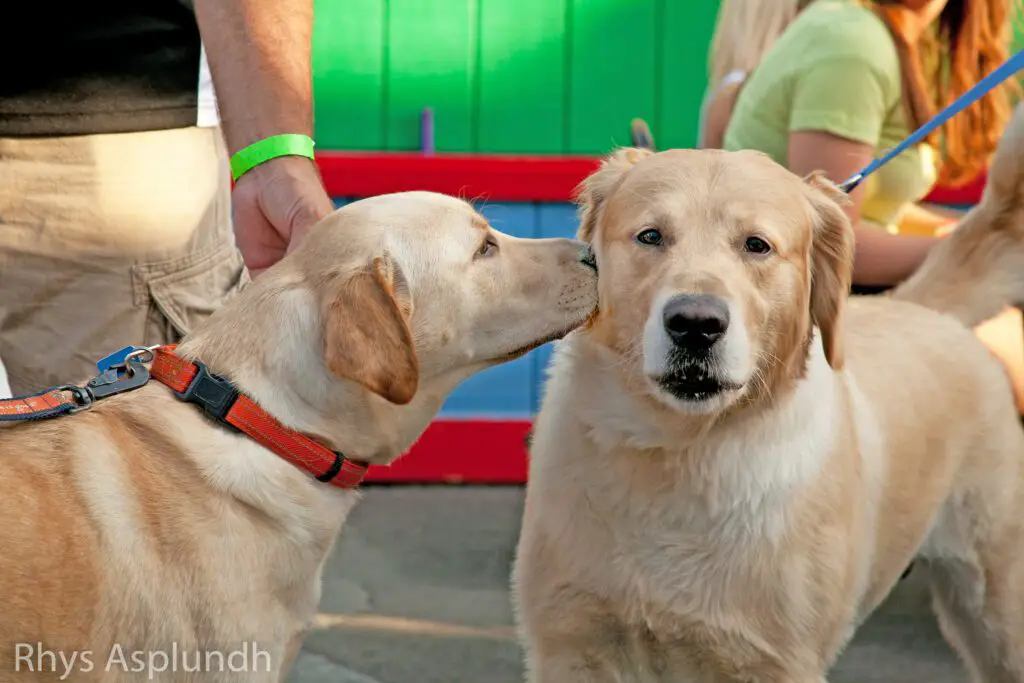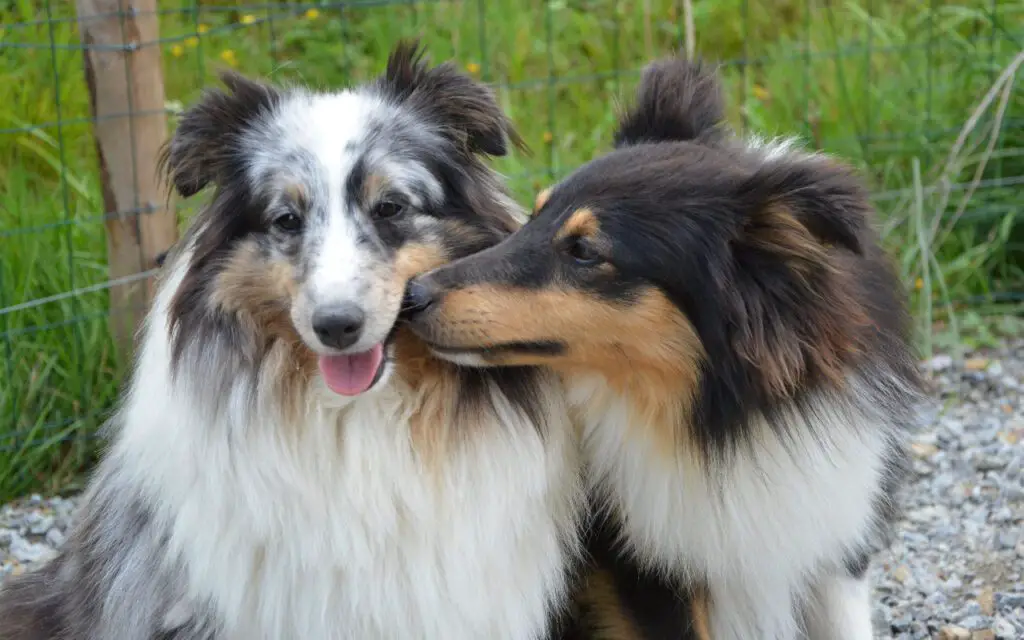The intriguing question of whether a dog can be gay opens up a fascinating exploration of canine behavior, social dynamics, and the role of instinct in their lives.
To understand same-sex interactions among dogs, it is crucial to look beyond human perspectives on sexuality and delve into the underlying reasons behind these behaviors.
This discussion will provide insights into the complexities of dog behavior, examine the factors that contribute to same-sex interactions, and evaluate if it’s appropriate to label a dog as being gay.
- Can a Dog Be Gay?
- Does It Matter If Your Dog Is Gay?
- Why Is Same-Sex Sexual Behavior So Common In Animals?
- Why Do Male Dogs Hump Other Male Dogs?
- What Do I Do If My Dog Humps Too Much?
- How Do Dogs Demonstrate Sexual Behavior?
- FAQs
- Q: Can dogs be gay?
- Q: Does a dog’s sexual behavior mean they are homosexual?
- Q: Can neutering or spaying a dog prevent homosexual behavior?
- Q: Are there any differences in homosexual behavior between male and female dogs?
- Q: Can dogs of the opposite sex engage in homosexual activity?
- Q: Is it possible to train a dog out of homosexual behavior?
- Q: Can cats be gay like dogs?
- Q: Do dog owners need to be concerned if their dog is homosexual?
- Q: How can one tell if their dog is gay?
- Q: Can dogs actually be in love with another dog?
- In Conclusion
Can a Dog Be Gay?

No, dogs are not capable of being gay. While it may seem like some dogs prefer the company of other same-sex animals, this behavior does not indicate any kind of sexual preference or orientation.
In fact, many behavioral issues in dogs can be attributed to a lack of socialization and proper training rather than any sort of “sexual preference.”
Dogs do not have a concept of sexual identity or orientation as humans do, so labeling them as either heterosexual or homosexual would be inappropriate.
However, there are certain behaviors that a dog might display which could be considered “gay” by human standards.
For example, male dogs may mount other males during playtime or when defending territory.
This does not mean that the dog has a sexual preference for other male dogs, however; it is simply an instinctive behavior.
Similarly, female dogs may display friendly behaviors towards other female dogs including grooming and cuddling. Again, this does not indicate any kind of sexual orientation.
Does It Matter If Your Dog Is Gay?

Whether your dog engages in same-sex interactions or mounting behaviors, it is important to remember that these actions are usually driven by factors such as dominance, play, hormonal influences, or social learning, rather than a clear-cut notion of sexual orientation as understood in humans.
From a pet owner’s perspective, it should not matter if your dog appears to have a preference for same-sex partners.
The primary focus should be on providing a loving, supportive, and understanding environment for your canine companion. Ensuring their physical and emotional well-being, attending to their needs, and establishing a strong bond with them are the key aspects of responsible pet ownership.
If you observe any unusual or concerning behaviors in your dog, it is always a good idea to consult with a veterinarian or a professional dog behaviorist.
They can help determine if there are any underlying medical or behavioral issues that need to be addressed. In conclusion, the most important thing is to love and care for your dog, regardless of their behaviors or perceived preferences.
Why Is Same-Sex Sexual Behavior So Common In Animals?
Same-sex sexual behavior is common in animals for various reasons. It is essential to understand that these behaviors might not be solely related to reproduction but can serve several purposes within the context of animal social dynamics and biology.
Some of the reasons for the prevalence of same-sex sexual behavior in animals include:
- Social bonding: Same-sex sexual behavior can help strengthen bonds between individuals, promoting group cohesion and cooperation. This is particularly important in highly social species, where maintaining strong relationships is crucial for survival.
- Practice and learning: Young animals may engage in same-sex sexual behavior as a way of practicing and learning the mechanics of mating. This can help them become more successful when they eventually engage in reproductive activities with opposite-sex partners.
- Dominance and hierarchy: In some species, same-sex sexual behavior can be used to establish or reinforce dominance hierarchies within social groups. This can help maintain order and stability within the group and reduce conflicts over resources or mates.
- Reducing tension: Engaging in same-sex sexual behavior can help diffuse tension or aggression between individuals, particularly in species where competition for resources or mates is high.
- Reproductive advantages: In some cases, same-sex sexual behavior can provide indirect reproductive benefits. For example, it can help an individual become more attractive to potential mates by demonstrating their sexual prowess or improving their social status within the group.
It is important to recognize that same-sex sexual behavior in animals serves various functions beyond human concepts of sexual orientation.
These behaviors are a natural part of the diverse spectrum of animal life and play essential roles in their social dynamics, survival, and overall well-being.
Why Do Male Dogs Hump Other Male Dogs?
Male dogs may hump other male dogs for a variety of reasons, including dominance, stress relief, or simply because it feels good.
Dominance-related humping is most common in unneutered males and usually begins when the dog is just reaching adulthood.
This type of humping is often accompanied by other dominance-related behaviors such as mounting, barking, and aggressive posturing.
Stress-related humping can be triggered by changes to routine, excessive exercise, lack of proper socialization with humans and other animals, or health issues like allergies or infections.
Finally, some male dogs may simply enjoy the sensation of humping; while this behavior isn’t necessarily normal or healthy, it often doesn’t cause any harm to other animals or people.
What Do I Do If My Dog Humps Too Much?
If your dog’s humping behavior has become too much to handle, there are some steps you can take to help them stop.
The first step is to identify what triggers the humping behavior. Common triggers may include excitement, stress, boredom, or even just seeking attention from humans or other animals.
Once you have identified the triggers for the humping behavior, start working on diverting your pet’s attention away from it. Try redirecting their attention with a toy and/or offering positive reinforcement when they successfully engage in an alternate activity such as fetching a ball.
If your dog continues to hump despite these attempts, you should consult with a veterinarian or animal trainer who is knowledgeable about canine behavior modification techniques. They may be able to suggest additional strategies that can help your dog learn appropriate behaviors and reduce their humping behavior.
How Do Dogs Demonstrate Sexual Behavior?
Dogs demonstrate sexual behavior in many ways, from mounting other dogs to urinating on the things they consider “theirs.”
Dogs display a wide variety of actions that are all associated with their natural instinct for reproduction.
The most common way for dogs to demonstrate sexual behavior is through mounting, which involves the dog humping another dog or object.
This could be done out of playfulness or as part of an attempt at mating.
Dogs also use urine scent marks as a way to mark their territory and let other dogs know that area is theirs.
Other canine behaviors such as licking genitals, raising hind legs when urinating, and chasing after same-sexed canines may indicate a desire to mate or reproduce.
FAQs
Q: Can dogs be gay?
A: Yes, some dogs exhibit homosexual behavior, such as mounting or humping other male dogs. This behavior may be explained by a variety of reasons, including dominance or sexual interest. Just like humans, dogs can have a sexual orientation.
Q: Does a dog’s sexual behavior mean they are homosexual?
A: Not necessarily. Dogs, especially puppies, may exhibit mounting behavior as a way to play or establish dominance. However, if a dog consistently shows interest in dogs of the same sex and engages in sexual activity with them, they may be considered homosexual.
Q: Can neutering or spaying a dog prevent homosexual behavior?
A: No. Sexual orientation is not solely determined by the presence or absence of reproductive organs. Neutering or spaying a dog may reduce their overall sexual activity, but it is not a guaranteed way to prevent homosexual behavior.
Q: Are there any differences in homosexual behavior between male and female dogs?
A: Generally, male dogs are more likely to exhibit homosexual behavior than females. This may be due to the fact that male dogs are more sexually motivated and dominant in nature.
Q: Can dogs of the opposite sex engage in homosexual activity?
A: Yes, dogs can engage in sexual activity with dogs of the same or opposite sex. However, if a dog consistently shows interest in dogs of the same sex and engages in sexual activity with them, they may be considered homosexual.
Q: Is it possible to train a dog out of homosexual behavior?
A: No, a dog’s sexual preference cannot be changed through training. It is important to understand that homosexual behavior is completely natural and normal in the animal kingdom, and attempting to change it can be harmful to the dog.
Q: Can cats be gay like dogs?
A: Yes, cats can also exhibit homosexual behavior. However, it is less common in cats than in dogs and other animal species.
Q: Do dog owners need to be concerned if their dog is homosexual?
A: No, a dog’s sexual orientation should not be a cause for concern for their owners. It is a natural part of their behavior and should be accepted without judgment.
Q: How can one tell if their dog is gay?
A: It may be difficult to discern a dog’s sexual orientation without observing their behavior towards other dogs. If a dog consistently shows interest in dogs of the same sex and engages in sexual activity with them, they may be considered homosexual.
Q: Can dogs actually be in love with another dog?
A: While it is impossible to know for sure if dogs experience emotional love as humans do, it is possible for dogs to form deep bonds with other dogs and exhibit affectionate behavior like cuddling.
In Conclusion
The question of whether a dog can be gay requires a nuanced understanding of canine behavior and social dynamics.
Same-sex interactions among dogs can result from various factors, such as dominance, play, or hormonal influences, rather than a clear-cut notion of sexual orientation as understood in humans.
It is essential to recognize the unique aspects of dog behavior and avoid anthropomorphizing their actions.
Ultimately, providing a loving, supportive, and understanding environment for our canine companions, regardless of their behaviors, should be the primary focus for pet owners.





Leave a Reply